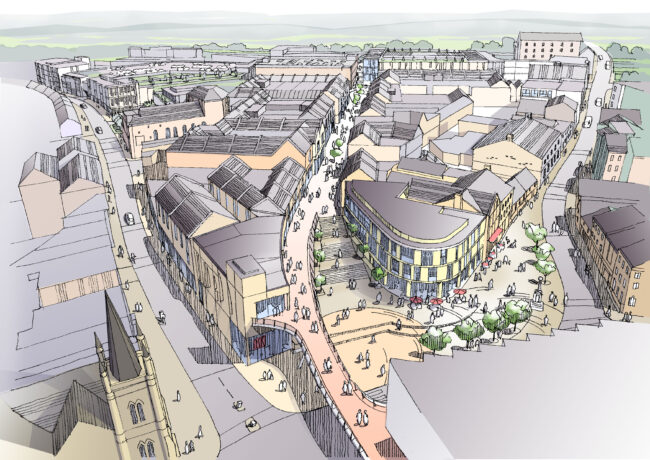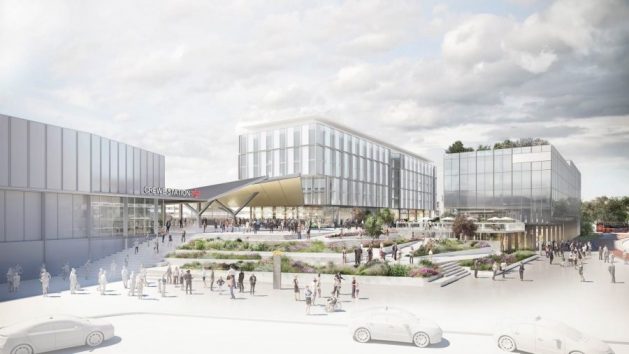Lancaster and British Land part ways on £250m Canal Corridor North
Lancaster City Council is set to terminate its development agreement with British Land on the long-stalled Canal Corridor North over funding and legal issues, instead choosing to rebrand the site as the Canal Quarter to create an updated development plan for the area.
The council signalled last October it was looking to push on with development, which the FTSE 100-listed British Land bought from Centros in 2012. The 16-acre area covers Duke’s, the Grand, the former Mitchell’s brewery, and the Musicians’ Co-Op alongside the Lancaster Canal.
Steps included continuing negotiations with the developer to reach Heads of Terms, which would then be considered by the council at a later date.
Chief executive Susan Parsonage told Place North West last October the council was hoping to secure these terms by this spring, but a report to the council has now said it has become “inevitable” that British Land’s proposals “cannot be recommended”, largely due to legal and funding issues.
British Land and the council had been working on a viability proposal for the site since October. According to the report, released ahead of a cabinet meeting, the developer expected the council to underwrite any funding gap. This was originally estimated at £15m, but then rose to £20m, which the council said would be an “unacceptable financial risk” which could “potentially undermine the council’s financial stability and sustainability”.
Issues raised over state aid contributions, first flagged in October, also have still not been resolved.
Lancaster said the discussions with the developer had been “open and constructive”, but there were “key elements of the existing scheme upon which British Land could not compromise”.
The council will now look to terminate the current agreement with the developer.
The area was first earmarked for development in the late 2000s, but planning permission for a 300,000 sq ft development anchored by Debenhams was refused at inquiry in 2010.
British Land then took over the site, and proposed a £180m project, to include 250,000 sq ft of retail; 70,000 sq ft of food & drink space; an 82-bed hotel; 1,000 units of student accommodation; an underground car park with 786 spaces; and an ‘arts hub’ building. Lancaster University came on board as a backer of the scheme in 2016.
Including the student accommodation, the overall development value of the area was expected to be £250m. The council estimated the net investment required to bring forward the scheme would have been £125m, with £100m covered by British Land and the council agreeing in principle to invest £25m.
Despite the termination of the agreement, Lancaster said there was “an opportunity to move into a new stage of the scheme’s evolution.”
“The work undertaken in the last few years had provided invaluable information and an excellent foundation for promoting a new development that will be more viable and better meet the changing needs of residents and potential customers.”
Updated proposals are likely to provide less retail floor space, and will focus on new uses for historic buildings and the provision of more residential space “for a variety of different occupiers”.
Student accommodation and the arts hub still remain part of the plans, but the council also wants to add business space, particularly targeted at digital companies.
One option is for the council to buy British Land’s part of the site, and the developer has indicated it is willing to give the council “first call” on its landholdings.
The council will now undertake “further work” to ascertain land values and the associated costs of potentially acquiring the land, which will be presented back to the council at a later date. This will be paid for by Lancaster’s existing Canal Corridor North funding reserve.
A consultation on these plans is likely, with any new draft development and financial framework to be taken to public and community consultation before it is finalised.
Subject to a plan being agreed, the council said it hopes to start on site with this next iteration of the project in 2019.
Cllr Janice Hanson, cabinet member with responsibility for planning and regeneration, said: “We have a huge obligation to get this major development right. We’d very much like to thank British Land for the considerable expertise they have brought to this highly complex process up to this point, but we have agreed to conclude our partnership.
“While the city council remains absolutely committed to the regeneration of the site, the new proposal will be a different scheme, one which supports greater multi-purpose use and is easier to deliver.
“We now want to bring forward for the people of Lancaster an exciting transformation that delivers on everyone’s ambitions for this great city. This includes working with partners to achieve our aspirations for high-calibre arts and culture provision.”
British Land was approached for comment.




